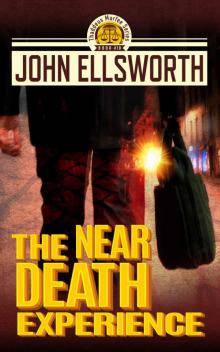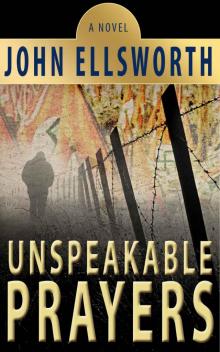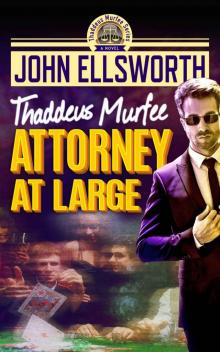- Home
- John Ellsworth
Sakharov the Bear (Michael Gresham Legal Thrillers Book 5) Page 18
Sakharov the Bear (Michael Gresham Legal Thrillers Book 5) Read online
Page 18
"What the hell, Mikhail?" he gruffly shouts. "Are you trying to lose this thing?"
I look down at my shaking hands. I've never been in so much trouble in a courtroom before, not with an adverse witness.
"It veered out of control and then it just exploded, Van," I lamely reply.
"Right now he has you viewed by the jury as an American CIA agent coming into their court and using a false name. What are your plans to climb out of this train wreck?"
"I really don't know." I'm shaken; it is very difficult to think clearly.
Van's voice is soothing. "Let's back up to where it went off the rails. You were asking him about the bill of lading. He denied everything, saying it was only a minor piece of evidence for his work as a passport examiner. May I suggest we begin by investigating this item further after the trial today?"
"Further? Such as?"
Van leans back in his chair. "How about we track down Ehrlyich International Shipping, who provided the bill of lading. See what we can pick up there?"
"How would we do that?"
Van purses his lips. "Listen, Mikhail. You are in very serious trouble inside that courtroom. You have been accused of being CIA. You have been accused of being an American who's using a phony Russian Federation identity. If you are convicted of these things you will definitely find yourself in a work camp for the rest of your life. Plus, there is the problem with Xiang and Petrov. If you go down, they go down too. So, in answer to your question about what we might try, let me suggest we try everything conceivable. Including breaking and entering to get to their records."
"That's not encouraging. I see huge problems there."
He shakes his head violently. "But look at the problems you've created inside the courtroom! It’s a house of cards in there and it's collapsing! Desperate times call for desperate measures, Mikhail."
He continues staring at me as if gauging whether he's getting through to me with the reality of our case. He is. He is getting through. And he's right. We're going to need to take desperate steps. I'm suddenly wishing Marcel were here to help me, but he's not. This time the dirty work falls to me. There's no one else.
"All right," I finally say, "tonight we go."
"No, tonight you go. There's no 'we' in this."
There it is. Now I'm truly alone, caught up in a Russian snare in a country I don't know and all the rest of it.
We finish our little talk and return to the courtroom. I request of the judge that we recess and allow me to finish up with Nurayov in the morning. To my great astonishment, the judge agrees. Then we are in recess for the night.
I take a taxi back to the hotel with Antonia riding along. My mind is racing as I go. I barely hear her "Goodnight."
The time has come for me to put up or shut up.
And I'm never one for shutting up.
Chapter 33
Michael Gresham
Van calls me at nine o'clock that night. I'm sitting in my hotel room, dressed in black jeans, a black turtleneck, and black watchcap. My heavy black goose down coat is hung by the door, waiting.
"Okay, Mikhail," Van begins, "I've located Ehrlyich International Shipping. Their main office is at the North Pier on the Moskva River. That is a good distance away. My suggestion would be for you to rent a car—"
"Hold on, Van. I can't read Russian and their building sign will definitely be in Russian. How will I know when I've found it?"
"Hmm. Good point."
"Any suggestions?"
"All right, Mikhail, I'll drive you there. But I won't wait around. You'll have to get back to the hotel on your own."
"Nice, Van. We'll compromise. You wait several blocks away and I'll come to you when I'm done. How's that?"
"All right, all right."
"While we're at it, there's one other thing. The bill of lading is in English. Will I be looking for a file or folder that has English on the cover or Russian?"
"You better hope it's English, my friend, because I'm not going in with you."
"I figured as much. I'm not trying to get you to. I'm just trying to understand what I'm up against here."
"Mikhail, this might be your last night of freedom in Russia."
"What?"
"The judge could very well decide tomorrow that you're CIA and that you impersonated a Russian citizen and just throw you in jail."
"Without a jury verdict? He can just do that?"
Van sighs. "We're in Russia, remember?"
He's absolutely right. There is no Bill of Rights here—not even close. Anything can happen.
"I remember."
"One last thing. Do you have cash? American dollars?"
"I have about two thousand USD."
"Good. Bring it along. You might need to make a bribe."
"Good thinking. How long will it take you to get to my hotel, Van?"
"Funny thing is, I'm pulling under the portico right now. Hurry downstairs and we're off."
"So you were coming anyway. Good man."
"I knew I would have to find their offices for you. Least I can do."
"I'm on my way."
Together we drive several miles north along the Moskva River. The lights have thinned out along here and the riverbank is very dark, although buildings parallel it this side of the water. I notice there are very few vehicles. What there is of traffic is mostly tractor-trailer rigs lugging along under what appear to be huge loads bound for the river barges. We pull into a drugstore parking lot and Van dashes inside. He returns swinging a silver flashlight. It flashes on and off then he climbs back inside the car. He passes the light to me and I stuff it inside my coat pocket. We're off, headed back onto the highway.
Van explains as we drive along that the Moskva River, at the city of Kolomna, flows into the Oka River, itself a tributary of the Volga, which ultimately flows into the Caspian Sea. In this manner Moscow has access by water to the sea. As one might expect, the river traffic is heavy and runs 24/7. Even as we drive along we can see the barge lights playing up and out of the river, locating navigation points along the shore, and proceeding cautiously where the river isn't all that wide and deep. Then we are slowing and we inch along to the North Pier. Van is reading the signs on the buildings as go.
Then, "That's it! See, it says 'EIS'. And below that in smaller letters is the name, 'Ehrlyich International Shipping'. I'm going to drive by and park several blocks away. Then you're on your own, Mikhail."
My heart flip-flops in my chest. I almost need to pinch myself to be certain I'm not dreaming. I have never committed a burglary in my life. Yet, I'm about to. I wish upon all wishes that Marcel were with me tonight. I think of him, locked away in Moscow City Jail, probably cold and shivering like I was; my determination redoubles and I know I'm going to do this thing.
Three blocks further along, Van turns left and goes up two blocks and then pulls over to the curb. We are beside a park and on the other side of the street are fairly large houses and streetlights.
"Luck," he says, as I open my door.
I step outside and am smacked by the bitterly cold air. For once it isn't snowing—which means I won't be leaving tracks in new snow and the old snow is too slushy and tracked up to follow me anyway. Or so I think. I trudge back the way we came one block and then head right along the road that parallels the front of Ehrlyich International Shipping. With any luck, the building will stretch all the way back to this road and I can reduce my exposure around the front or even along the side. The going is slushy and slippery in places, especially just off the curbs where the day's melt has re-frozen and threatens to cause me to slip and fall. But I don't. Chicagoans like me don't fall on ice because we always expect it, even year around, it seems, and we anticipate those spots where it lurks.
Two blocks up there is a stoplight and I'm walking directly toward it and the streetlight that illuminates the intersection. Just briefly the light shows the planes of my face clearly to anyone who might be watching. I pull my head down into my coat as far as th
e collar allows, but I'm still exposed. I can only pray that no one has eyes on me. Hurrying to the other side, I speed-walk to the shadows beyond the intersection and then I—with my black clothing and watchcap—am absorbed into the black night.
One more block to go. Just as I make mid-block, a dog loose in someone's front yard begins growling. Then a yap-yap sounds, then it erupts into all-out barking as I make my way along its fence. It's not until I reach the next corner and turn left that the barking stops. Up to the alley I go and there, at last, is the rear wall of my building. I turn left down the alley and walk along a couple of hundred feet. I'm casing the joint, as they say in the gangster movies. What I'm finding looks very unlikely, I might add. For there are no alley-level doors, no windows, no obvious means of ingress that I can spot. Which leaves me wondering how the hell I'm going to break in.
I walk back down to the loading dock—actually a triple-dock affair. Three articulating doors reach from the top of the opening down to the lip of the dock. They are heavy steel and don't look penetrable. But I notice each one has a pull handle positioned at its center almost all the way to the bottom. The doors are set back from the lip of the dock maybe eighteen inches. Who was it who said, "Give me a level long enough and a fulcrum to place it on and I shall move the earth?" Was that Archimedes? The problem, viewed in this light, seems solvable.
So I need a lever. Nothing jumps right out at me, so I begin policing the alleyway. Down to the far end I snoop around and still nothing. So I dash across the street and into the next alley. Then, lo and behold, it can only be a plumbing company, because, just over a six-foot chain link fence, are pipes of all lengths lying like toothpicks in a long rack. Checking all around me, I grip the fence in my hands and start to climb up out of the alley. Another large step up and I'm at the top, swinging my leg over the crest, now easing myself off and jumping down to the other side. Without much thought given to the problem, I grab a twelve-foot length of two-inch pipe and locate an old cement block. Both are tossed over the fence to the alley. I survey my work as I begin climbing, and see that the block has shattered. So, back down until I find another. This time, it's closer to the building and this time I move near and a motion detector senses me. A floodlight blinds me. I'm totally announced to the world by the horrible light. I freeze. Then I seize my cement block and run for the fence. This time I don't throw the block over; clutching it in my left hand, I use my right hand and my feet to scale the fence and then drop back down into the alley. By now the floodlight has blinked off and I wait several moments while my eyes again adjust to the dark. Then I grab my pipe and I'm off: the pipe up over my shoulder, the cement block flopping against my thigh as I jog back across the street.
Back to the three dock doors I fly, arriving winded and breathing heavily. I have no clue whether my approach is going to work and I have no clue whether the doors themselves are wired to an alarm system. I'm guessing they are, but there's nothing I can do about that. At this point, I'm out of choices. I can only move ahead with my weak plan. One thing in my favor: the building is very old, the bricks crumbling along the edges all around the three doors. Maybe, I'm hoping, they haven't wired these, thinking no one can get them open anyway.
Hoisting the cement block into place on the lip of the dock, just this side of the middle door, I stand back, lay my pipe across it, and dig the far end of the pipe in under the door's central handle. I pry down and test. The pipe stays locked under the handle. So I press down even more, bringing some of my weight to bear on the problem. Then I ease up and step up to the door handle I'm prying. Much to my great relief it doesn't appear to be bending upward. That would have been the end of my plan right there if the handle bent and gave way before the door moved up. But it hasn't bent and seems solid enough.
So I place my lever back across the block and this time apply much more weight. Now I'm almost lying across the pipe and allowing more and more of my weight to press downward. I'm about to go check the handle again when suddenly, with a loud crack like a starter's pistol, the door springs free of its lock and is wheeling upward. I cringe, shut my eyes, and wait for the alarms I'm almost certain will begin wailing. Several moments slide by and still I'm waiting. It slowly occurs to me that no noise alarm is going off. A silent alarm, perhaps. There's nothing I can do about that, so I lay my pipe lengthwise up against the wall of the dock so it appears to be a castoff lying there. I climb up onto the ramp, duck down beneath the door, and step inside the loading dock.
It is totally black. I turn and pull the door all the way back down. Then my flashlight is brought up out of my coat pocket and the switch slides. I find myself in a catch-all room with a wall of tools hung from pegboard, round rolls of copper tubing and white electrical wire, barrels of nails, and a long wooden workbench. There are work gloves scattered about, pliers and wrenches, different lengths of wire, and a metal vise. I have no idea what kind of business this room is adjoining, but it is typical back-room stuff for almost anything you might imagine. So, I still haven't arrived. I twist the knob and push open the inner door. I'm facing a rectangular room that must hold forty work cubicles. All manner of plants and balloons and giant dolls levitate above several of the cubes, giving the place a lived-in/worked-in look and feel. People spend a third of their lives here and in one of these drawers—or in the myriad of filing cabinets that take up almost every inch of outer wall space—the bill of lading file I have come here for might be found.
But where to begin?
For someone who has just walked in, there is no rhyme or reason to the place. There is not one clue about which employee might have helped expedite the sale of arms from Henrik Nurayov, the arms that moved into the shipper's holds on its barges outside in the river. But at least I know I'm in the right place. I know I've found the shipper, and I force myself to focus on what I came for.
I remember how American companies work, where the higher you go in their buildings the higher you go in their hierarchy. Sure enough, on the other side of the room is a bank of two elevators. I hurry over and punch the button between them. Doors fly open and I step inside the closest one. There are three floors above, as there are three numbered buttons above the first. I hit four and the elevator begins its climb.
The door opens. Inside the elevator car the automatic light is on. Outside in the hallway it is pitch black. I step out and look right and left. At the far distance in either direction are signs lettered in red neon. I'm guessing those indicate exits as they would in the U.S. Also, in America, there is a rush among corporate employees to climb the ladder and get that proverbial corner office. So why wouldn't the same be true here? Why does this matter? Because the higher-ranking officials are more likely to have their fingers in many pots at once, including the sale and shipment of weapons of war. Especially that.
I mentally flip a coin and head to my right. At the exact moment I take my first step I see the beam of a flashlight play against the far left-hand wall. Someone is coming into the far end of the hall from where it comes off the right. I back up against the first office door and twist the knob. Locked. I step across the hall and try another. Locked again. I'm literally in the dark and don't know what to do. So I quickly close the distance between me and the light on the wall. Then, when I'm almost there, I feel the wall open on my right. I step inside a rather large room with windows that face the night sky. I can actually see the reflection of streetlights below coming up through the mist and snow squalls that have begun again. I race across the room and step behind a waist high table with a modesty shield. I squat down behind it and slow my breathing. Then I can hear the footsteps coming and I can see the light outside now shining down the hallway I just left. The light shudders up and down and back and forth and the footsteps come nearer. The person behind the flashlight is whistling a tune, Deep in the Heart of Texas. When he reaches the line, The sage in bloom is like perfume, he stops, enters my room, and switches on the lights. Then all goes quiet.
My entire diaphragm struggles to
exhale in a huge whoosh. I strain against the impulse, forcing myself to breathe shallowly and soundlessly. Footsteps can be heard pattering in my direction. When the person is perhaps ten feet away, the footsteps slow and then stop. A match can be heard scraping along its igniter and then flaring up. Within seconds I smell cigarette smoke and hear a man's voice exhaling with no small amount of satisfaction. Another puff, another exhalation, and I'm about to burst with anticipation.
Then the steps turn away and retreat back the way they came. The person again pauses at the entrance to my room. I can picture him looking around one last time before switching off the lights—and then the lights are indeed doused. Now I'm in the dark, my eyes aren't adjusted, and I don't dare move, for fear he has only feigned leaving the room. I decide to give it five minutes and begin counting slowly to three-hundred.
At four-hundred I stand upright. My knees are trembling and crying out to buckle, but I support myself with my hands on the desk as I stare directly at the opening into my room. At this point I know I'm in silhouette against the windows behind me and that makes me easily seen by anyone passing by. But the time has come to get what I came here for, so I cross to the entrance and stick my head into the hallway. All clear both ways—at least there is no flashlight beam.
Down the hall I slither, one hand on the wall to my right, my eyes trained on the door ahead of me that opens onto the corner office. I'm praying it isn't locked. But it is, I find when I reach it. Now what?
I'm standing there in the open, unable to proceed inside, without a hint of an idea how to get in.
My mind roams back over TV shows and movies. Wasn't there something about sliding a credit card inside the seams between frame and door and forcing the lock to give way? Stupid as it sounds, I try it. I try it because I'm all out of good ideas of my own.

 Girl, Under Oath (Michael Gresham Series)
Girl, Under Oath (Michael Gresham Series) The Fifth Justice (Michael Gresham Legal Thrillers Book 10)
The Fifth Justice (Michael Gresham Legal Thrillers Book 10) Michael Gresham (Book 5): Sakharov the Bear
Michael Gresham (Book 5): Sakharov the Bear Voices In The Walls: A Psychological Thriller (Michael Gresham Series)
Voices In The Walls: A Psychological Thriller (Michael Gresham Series) Chase, the Bad Baby: A Legal and Medical Thriller (Thaddeus Murfee Legal Thriller Series Book 4)
Chase, the Bad Baby: A Legal and Medical Thriller (Thaddeus Murfee Legal Thriller Series Book 4) The Girl Who Wrote The New York Times Bestseller: A Novel (Thaddeus Murfee Legal Thrillers Book 8)
The Girl Who Wrote The New York Times Bestseller: A Novel (Thaddeus Murfee Legal Thrillers Book 8) The Defendants: Crime Fiction & Legal Thriller (Thaddeus Murfee Legal Thriller Series Book 1)
The Defendants: Crime Fiction & Legal Thriller (Thaddeus Murfee Legal Thriller Series Book 1) Hellfire (Sisters In Law Book 2)
Hellfire (Sisters In Law Book 2) A Young Lawyer's story
A Young Lawyer's story Annie's Verdict (Michael Gresham Legal Thrillers Book 6)
Annie's Verdict (Michael Gresham Legal Thrillers Book 6) Legal Thriller: Michael Gresham: Secrets Girls Keep: A Courtroom Drama (Michael Gresham Legal Thriller Series Book 2)
Legal Thriller: Michael Gresham: Secrets Girls Keep: A Courtroom Drama (Michael Gresham Legal Thriller Series Book 2) 30 Days of Justis
30 Days of Justis Sakharov the Bear (Michael Gresham Legal Thrillers Book 5)
Sakharov the Bear (Michael Gresham Legal Thrillers Book 5) Defending Turquoise (Thaddeus Murfee Legal Thriller Series Book 5)
Defending Turquoise (Thaddeus Murfee Legal Thriller Series Book 5) The Near Death Experience (Thaddeus Murfee Legal Thriller Series Book 10)
The Near Death Experience (Thaddeus Murfee Legal Thriller Series Book 10) Unspeakable Prayers: WW II to Present Day (Thaddeus Murfee Series of Legal Thrillers)
Unspeakable Prayers: WW II to Present Day (Thaddeus Murfee Series of Legal Thrillers) Attorney at Large (Thaddeus Murfee Legal Thriller Series Book 3)
Attorney at Large (Thaddeus Murfee Legal Thriller Series Book 3) The Law Partners (Michael Gresham Legal Thriller Series Book 3)
The Law Partners (Michael Gresham Legal Thriller Series Book 3) Annie's Verdict
Annie's Verdict The Mental Case (Thaddeus Murfee Legal Thriller Series Book 6)
The Mental Case (Thaddeus Murfee Legal Thriller Series Book 6)